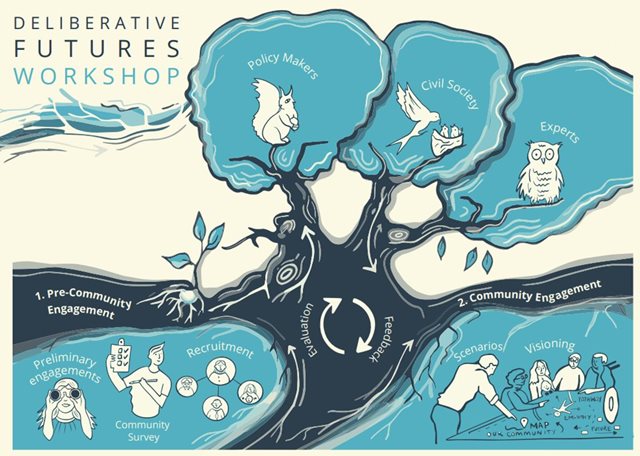
Date: 05 May 2021
Imagining2050 has launched a new Toolkit promoting Deliberative Dialogue with Local Communities
A cross-disciplinary research team from University College Cork (UCC) and Queens University Belfast (QUB) has worked with communities in Ireland to co-develop visions and scenarios for change at local level.
The team has recently launched the ‘Deliberative Futures’ Toolkit which draws from participatory and deliberative approaches to engagement. They also produced an animation to help illustrate the value of adopting these democratic innovations at local level.
Participatory approaches emphasise the multiple benefits of wide participation, through inclusion, direct engagement and empowerment. Deliberative approaches on the other hand focus on well informed, future-oriented and reason-based discussions.
The tools and processes have been designed to encourage inclusive and interactive dialogue and the incorporation of visual and multimedia elements is proposed as a way to facilitate local-led dialogues and engagements. The toolkit offers guidance and advice on good practice with regard to participation and deliberation, to support the uptake of new forms of engagement led by community groups, educators and local policy makers.
A focus on local communities and future oriented plans seeks to promote collective visions of change and to co-develop clear pathways for tackling greenhouse gas house emissions and vulnerability to climate change. This inclusive and future focused approach is essential to help translate and clarify how national targets and ambitions for climate resilience transfer into actionable visions in our towns, villages and cities. The innovative work of Imagining2050 has strived to clarify these issues in ways that promote well informed, inclusive and engaging dialogues, leading toward a sustainable and just future for our communities in Ireland.
The scale and potential impacts of climate change can be quite daunting and often lead to climate anxiety and powerlessness. However, Dr. Gerard Mullally the lead scientist in this project and an Environmental Sociologist from UCC, says that ‘the promotion of inclusive and deliberative dialogue can lead to increased optimism and creative opportunities tempered by plausible outcomes’’. Dr Alexandra Revez, the Senior Postdoctoral Researcher in the project adds that ‘uncertainty is a limiting aspect of climate change at local level. So we need to be more explicit about what we know and don’t know. By doing this, we can help people take ownership of the risks at local level’.
You can find out more this work through the project’s website.
Imagining2050 Research Team: Gerard Mullally, Alexandra Revez, Clodagh Harris, Niall Dunphy, Fionn Rogan, Edmond Byrne, Connor McGookin, Paul Bolger, John Barry, Geraint Ellis, Barry O’ Dwyer, Evan Boyle, Stephen Flood, James Glynn, Amy Dozier, Brian Ó Gallachóir
Imagining2050 is funded under the EPA Research Programme 2014-2020. The EPA Research Programme is a Government of Ireland initiative funded by the Department of Communications, Climate Action and Environment. Imagining2050 also gratefully acknowledges co-funding from SEAI.